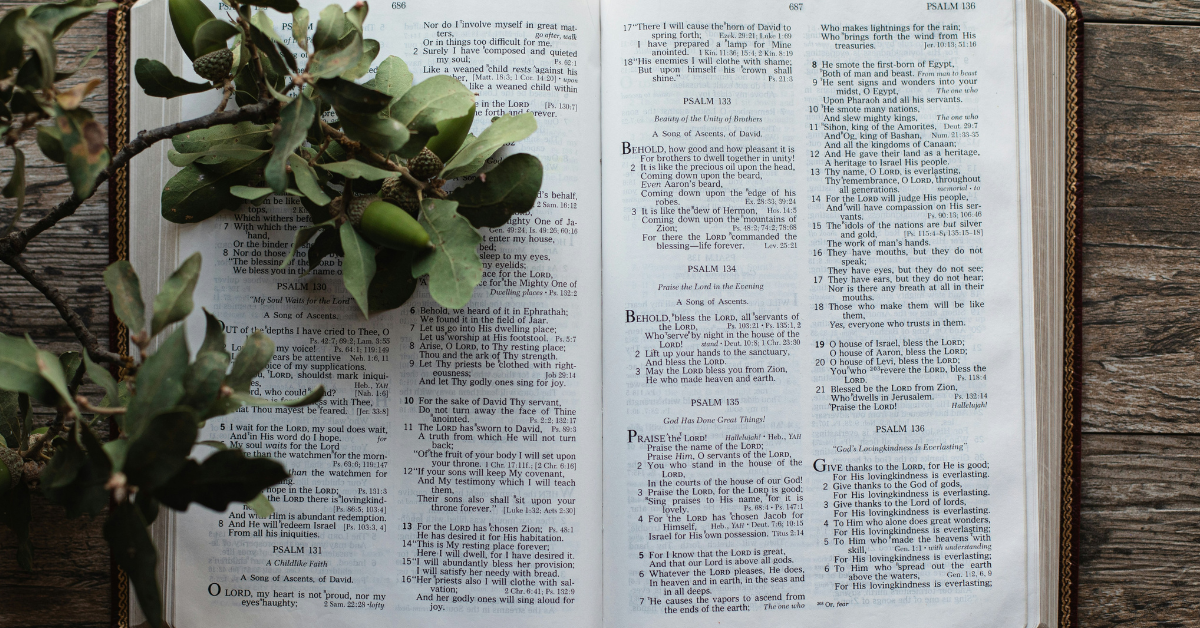Share Post – Follow Me
Summary:
The way we think about food matters. If we aren’t careful, food can take the place of God in our lives and become an idol. Today, I talk about my journey with food idolatry and share wisdom from the word to help you fight back.
Podcast Transcript:
Did you know that the way we think about food matters? Galatians 5:1 says,
for freedom, Christ set us free. Stand firm then and don’t submit again to a yoke of slavery.
Friend, if we’re honest, sometimes food is that “yoke of slavery”.
I’m Brigette Henry. And this is the Journey Together Podcast where I share all things faith, Christian living and your spiritual formation journey. And today we’re talking about Overcoming Food Idolatry.
Introduction
My relationship with food has been changing a lot lately. One of my goals for this month is to learn what God has to say about food. And as part of that goal, I’m reading the book “Full” by Asheritah Ciuciu. And one of the things that she emphasizes in that book is that nothing satisfies like God does.
I’ve started to listen to this book while I run in the mornings, and I’m only a couple chapters in. But the other day, I was eating a piece of cheesecake and I had made like this raspberry sauce to go on top of it because we had a ton of fresh raspberries, and it was so good.
And then the weirdest thing happened. I put my fork down on the plate.
And I remember looking at the cheesecake and the fork, like, kind of confused. Because honestly, friend, I do not remember the last time that I put down a utensil without finishing a dessert. And I was just so confused. But I felt like, like a veil had lifted, like a cloud had lifted.
I had clarity. And I just thought to myself, “I’m not hungry anymore. And if I eat more of this cheesecake, I’m not going to feel very good.”
And so, I just picked up the plate and went and put it in the fridge and I revisited the cheesecake later. But it was just such an odd thing. And there were three things that God taught me through this situation with the cheesecake.
1. God changes us.
I never imagined I would be the kind of woman that would put down a utensil before a dessert was finished. I’m always shoveling it into my mouth, and I never imagined that without really, honestly, thinking about it, without intention that I would ever, ever stop eating a dessert.
2. There isn’t an area of our lives He can’t touch.
For some reason, I seem to think that my issues with food, my sugar addiction, my desires to eat too much or to eat only junk food, I thought all of those things were out of God’s reach. And I’m not really sure why.
But this situation reminded me that there is not an area of our lives that He can’t touch. And there’s not an area of our lives that He doesn’t care about. He cares about how we eat and why we eat the way that we do.
3. There is help for us.
I had been feeling so helpless about my eating situation. When I was pregnant with my daughter, I got sick and as a result I was unable to process protein. So, for months I relied on carbs for energy, and I walked away from pregnancy with a raging sugar addiction.
And I have tried everything to stop eating so much sugar, but nothing seemed to help. And then, suddenly, I had this moment of clarity with the cheesecake. And I just realized there is help out there, like, there isn’t an area of our lives that God can’t touch. And He will put things in our lives that can help us.
An Invitation to a Food Journey
One of the things I’ve been praying for myself over the last few months is, “Lord, help me to love myself the way God does and not the way He doesn’t.”
I want to love myself. I want to take care of my body. I want to do what God intended for me to do with my body. But, I don’t want to be selfish, and I don’t want to put myself before others. I want to learn how to love myself the way that God does, and not the way that He doesn’t.
And I think that God has just invited me to a journey with food. I’ve been trying to change my mindset about food for a long time. And I suddenly saw this invitation. And I think that the thing that has really changed my mindset about food is that I just accepted His invitation. Rather than believing that God can’t change me, and that He can’t touch the food area of my life, or that there is no help for me and how I eat. I believed that God could take me on this journey and I accepted His invitation.
Three Verses to Fight Food Idolatry
So, I have three verses today that I want to share with you that I’ve been using to change my mindset about food. And I just want to say, I don’t know where you’re coming from. I don’t know what your relationship with food is. I think every woman struggles in some way with her relationship with food. And I don’t want to be disrespectful or ignorant of anyone’s issues or anyone’s situation. I just want to encourage you that God does change us, there is no area in our lives that He can’t touch, and there is help for us when we’re struggling with food idolatry.
So these are the three verses that I have been relying on to help me change my mindset about food.
Ecclesiastes 9:7
The first is Ecclesiastes 9:7. It says,
go eat your bread with pleasure and drink your wine with a cheerful heart, for God has already accepted your works.
Background
So, a little background on the Book of Ecclesiastes. Ecclesiastes was written by King Solomon, who was known for his wisdom, and it’s kind of a weird book. There are two things people usually know about Ecclesiastes.
The first is that Solomon says the word vanity a lot. He says “vanity, vanity, all is vanity.” He’s constantly talking about how life is vanity, and it’s like a breath. It’s like a wind, a vapor. That’s one thing people know about Ecclesiastes.
The second is the passage in Ecclesiastes 3 that talks about, “there is a time to live and a time to die.”
Those are usually the two things people know about Ecclesiastes. It’s actually kind of a weird book because it’s kind of a philosophy book. Like Solomon is writing his philosophy of life. And so. it kind of goes back and forth, where Solomon will say, like, “this is how life is. And it kind of stinks.” And then another time, Solomon says, “this is how life is and isn’t that great?”, and it kind of flip flops and it’s a little confusing to read. But it is a really interesting and great book when you actually get into it.
So, this verse, “go eat your bread with pleasure and drink your wine with a cheerful heart. For God has already accepted your works.” It kind of sounds like God is saying, “do whatever you want. Because I’ve already accepted whatever you’re going to do.” But actually that word “accepted” is the Hebrew word ratsah, which means “to take pleasure in”. And the Faith Life Study Bible commentary puts it this way:
The ability to enjoy life is not just a gift from God. It is his desire.
How This Verse Applies to Food
When it comes to food and this verse, I think that Asheritah Ciuciu explains it really well. In her book “Full”, she emphasizes that food is a good thing, but idols are good things that we put in the place of God. When we are experiencing food idolatry, when we are putting food in the place of God, we need to understand that food cannot satisfy us the way that God can. God intended for us to enjoy life and enjoy food. But we can’t enjoy food if we’re putting the pressure of food satisfying all of our greatest desires on it. That doesn’t make any sense.
This verse emphasizes that God wants us to enjoy life. What He created is beautiful, and He doesn’t want it to just go to waste. He wants us to enjoy it while we’re here. We’re not going to be here forever, but that doesn’t mean that we can’t enjoy His creation in the meantime. And I think the coolest thing about this verse is that it teaches us that God is pleased when we are pleased by His creation.
God is Pleased by Our Pleasure
I have an interesting example of this. So, my daughter is obsessed with the little Peep bunny. You know, like, that you see around Easter time, and you can get the marshmallow Peeps and eat them. She is obsessed with the bunny, and she has a little one that she got for her first Easter. Her grandma put her name and the year on for her first Easter. And my daughter would just walk around with it everywhere, so we went and got extras so that we made sure that we always had a Peep. That’s what we call it, Peep. We made sure that we would always have a Peep around for her. She sleeps with it; she takes it everywhere. She’s obsessed with it.
So, for Easter this year she was about 18 months and I crocheted her a Peep. Really soft, a little bigger than the little peep that she usually walks around with. And she loved it when she first saw it. But we both kind of forgot about it when we moved, and the other day her cousins dumped out all of her stuffed animals and she saw it again for the first time in months. And she just gasped, and she was like, “oh, Peep!” And she picked it up and she hugged it. And she went, “oh, Peep!” And then she held it back out so she could get a good look at it. And then she held it close again and gave it a hug and said, “Oh, Peep!” And she looked up at me and she gave me the biggest smile.
Made for Our Pleasure
And I just got this feeling of, like, overwhelming joy and pleasure that my daughter was pleased by what I created for her. And I think that’s how God feels about us. He made this earth for us to dwell in and to keep it. And He wants us to enjoy and experience pleasure in His creation. Food is part of His creation, and it is OK to enjoy food. We just need to make sure that we are enjoying it in its proper place and that we’re not turning it into an idol.
1 Corinthians 6:12
The second verse I rely on is first Corinthians 6:12. It says,
Everything is permissible for me, but not everything is beneficial. Everything is permissible for me, but I will not be mastered by anything.
Background
The book of First Corinthians is actually a letter to the church at Corinth from the apostle Paul. And the reason the apostle Paul was writing to the church at Corinth is because the Corinthian church was a little immoral.
You see the city of Corinth was on a trade route, and the city itself was known for its immorality. And so, the believers, both the Jewish believers and the Gentile believers in Corinth, were struggling to understand the faith that they had just accepted with the world that was around them.
And so, the Corinthian believers kept telling Paul, “We have freedom to do what we want”, which is where that phrase, “everything is permissible for me”, comes from. And if you remember at the beginning of this episode, I read Galatians 5:1, which says,
For freedom, Christ set us free. Stand firm then and don’t submit again to a yoke of slavery.
The believers at Corinth understood the first half of that verse. Christ that is free from the law and we have freedom in Christ. But they didn’t understand the second half. Which is that they could submit to yokes of slavery, and the immorality that they were experiencing and participating in is a good example of that yoke of slavery.
Not To Be Explicit
Now, I’m not going to get into any more details about what exactly was going on in the Corinthian Church because I’m trying to keep this podcast from being labeled explicit.
But I think we all understand that what Paul is saying here is that the phrase, “everything is permissible for me”, was not an acceptable response to what was going on in the Corinthian Church. That’s why Paul quotes that phrase back. He says, “everything is permissible for me”, but not everything is beneficial. “Everything is permissible for me”, but I will not be mastered by anything.
How This Verse Applies to Food
When it comes to food, I want to focus on those two phrases that Paul shared: “Not everything is beneficial” and “I will not be mastered by anything.”
“Not everything is beneficial”
We know that eating too much or eating only junk food or processed food, things like that, that isn’t beneficial for our body. I also want to address that starving and binge eating are also not beneficial for our body. Now, I’m not talking about eating disorders, eating disorders go beyond food idolatry. There’s a lot going on there mentally and emotionally that we are not going to have time to get into today.
But I think that those of us who don’t struggle with those disorders don’t realize that our relationship with food is still sometimes very unhealthy. For example, before or during a holiday. How many times have we skipped breakfast or eaten a very small breakfast on Thanksgiving Day because we know that we’re going to gorge ourselves later? That’s not beneficial for our body. While fasting does have its place, using it so that we can gorge ourselves later is not beneficial for our body.
“I will not be mastered by anything”
Paul also says he “will not be mastered by anything”. That word mastered is the Greek word exousiazō, which means “to control, exercise authority upon, or bring under the power of”.
Friend, food should not have power or control or authority over us. Think about the times that you might have said, “This is so good I can’t stop eating it.” Or maybe you can’t stop thinking about food. Like, you buy a carton of ice cream and it’s all you think about all day. That evening when you put your kids to bed and you’re going to allow yourself to have some ice cream. I promise I’m not speaking for experience there at all.
Maybe you’re waiting for that special treat. Like, you know there’s a special occasion coming up and you just think about it constantly because you’re finally going to let yourself have a slice of cake or a piece of pie. Or maybe you’re using food as motivation, which at first might look OK. But when we withhold food from ourselves to use it as motivation to get things done, we are allowing that food to have control over us and power and authority over us.
Everything is permissible for me, but not everything is beneficial. Everything is permissible for me, but I will not be mastered by anything.
1 Corinthians 10:31
The third verse I have for you is also in 1 Corinthians, because Paul continues this conversation with the Corinthian Church. But this time, he actually does address eating. In first Corinthians 10:31, he says,
So whether you eat or drink or whatever you do, do everything for the glory of God.
Background
In the city of Corinth, there were temples to false gods. And in these temples, they would hold feasts and they would sacrifice food to these false gods and serve it during the feasts in these temples.
In verses 14-22 of 1 Corinthians 10, Paul explains to the Corinthian Church that they cannot participate in these feasts, and he explains why. First, he says that because the false gods don’t really exist, the idols themselves are worth nothing. But he said that means that what the people in Corinth are actually sacrificing to is demons. And in verse 21, he says “you cannot drink the cup of the Lord and the cup of demons”. So, he tells them that they are not allowed to participate in these feasts.
He goes on and continues the conversation throughout the rest of chapter 10 because the food that was left over from these feasts was often sold in markets. And he encourages the people in the churches at Corinth not to ask where the meat came from when they purchase it. He explains that once they know where it came from, if it came from one of these feasts, or one of these temples, then you know it’s been sacrificed to idols. And you are responsible for not eating it for not partaking in that meat.
How This Verse Applies to Food
This whole conversation isn’t really about food. It’s about food, but it’s not really about food. And our struggle with food is not really about food either. Our struggle with food is about addiction. It’s about sugar or caffeine addiction. It’s about seeking comfort. It’s about looking for comfort in food rather than looking for it in our Creator. It’s about distraction. It’s about distracting ourselves from the things that are going on around us that we are afraid we can’t handle.
God made eating to be pleasurable, but we can’t misuse that pleasure. I keep this verse around to remind me that everything that I do should be to the glory of God. Not just eating, not just drinking, but everything that I do should be to the glory of God.
Recap
So just to recap those 3 verses, the first one is Ecclesiastes 9:7.
Go, eat your bread with pleasure, and drink your wine with a cheerful heart, for God has already accepted your works.
This verse reminds us that it’s OK to enjoy food and God intended for us to enjoy food. Not only that, but God is pleased when we are pleased by His creation.
The second one is 1 Corinthians 6:12, which says,
“Everything is permissible for me”, but not everything is beneficial. “Everything is permissible for me”, but I will not be mastered by anything.
This verse reminds us that food should not take the place of God and we need to be careful not to make food an idol or to reach for food to satisfy us in ways that only God can.
And the third verse is 1 Corinthians 10:31.
So whether you eat or drink or whatever you do, do everything for the glory of God.
Everything we do should be for God’s glory. Whether we’re eating, spending money, building relationships, whatever we do, everything we do should be for the glory of God.
Join the Conversation
Now, we’re going to continue this conversation and you will have a chance to join in. On this Saturday, June 22nd, I’m going to put a post up in our Facebook group that says “Join the Conversation”, and it will be an opportunity for you to participate in this conversation, to share your experiences, and to share verses that encourage you.
In order to join that conversation, you need to be a member of our Facebook group. It’s not difficult. The link is in the show notes. You have a few questions you have to answer, but I just ask those questions to make sure that you’re not going to spam the people in the group. It’s a private group, so the things that you share there will stay in that group. And we would be really excited if you would join us in that conversation.
There’s also no time limit on that conversation. So if Saturday, June 22nd, 2024 has already passed when you’re listening to this, you can go back into the Facebook group to find the conversation or you can restart the conversation in the group. We would always love to discuss anything that will help you in your spiritual formation journey.
Sign Off
If you enjoyed this podcast, please subscribe, rate the show, and share with your friends. Thank you for joining me today. I’ll be back next week as we continue this Spiritual Formation Journey Together.
Links:
CONTACT ME at: brigette@brigettehenry.com
Join the JOURNEY TOGETHER FACEBOOK GROUP: https://www.facebook.com/groups/journeytogetherchristianwomen
FOLLOW ME ON INSTAGRAM: https://www.instagram.com/spiritualformationjourney/
JOIN MY MAILING LIST: https://brigettehenry.com/subscribe
Things I Mentioned Today:
JOIN THE CONVERSATION: https://www.facebook.com/groups/journeytogetherchristianwomen
ASHERITAH CIUCIU’S BOOK, “FULL: FOOD, JESUS, AND THE BATTLE FOR SATISFACTION”: https://shorturl.at/RVAN2
Other Fun Links:
Not sure what to focus on during your QUIET TIME? Take the “Find Your Focus” Quiz here: https://brigettehenry.com/find-your-focus-quiz/
Check out THE QUIET TIME GUIDE and learn how to craft an intentional and effective Quiet Time: https://brigettehenry.com/product/the-quiet-time-guide
Visit MY WEBSITE: https://brigettehenry.com
Music by: Morning Garden – Acoustic Chill by Olexy on Pixabay
Notes:
All scripture is CSB (Christian Standard Bible)
All Greek word definitions come from Strong’s Definitions. You can get access to this resource and more at blueletterbible.org.
Share Post – Follow Me
Related Articles
Mental Health, Podcast, Self-Care, Spiritual Growth
find the podcast on these major platforms Summary Most of us wonder if we're truly following our calling. Did we miss [...]
Mental Health, Podcast, Self-Care, Spiritual Growth
find the podcast on these major platforms Summary Sometimes, scripture is used incorrectly to defend unbiblical ideas, especially when it comes [...]
Church, Church Hurt, Legalism, Mental Health, Mind Body Heart and Soul, Podcast, Self-Care, Spiritual Growth, Word of the Year
find the podcast on these major platforms Summary Want to grow closer to God in 2025? My vision is to help [...]






